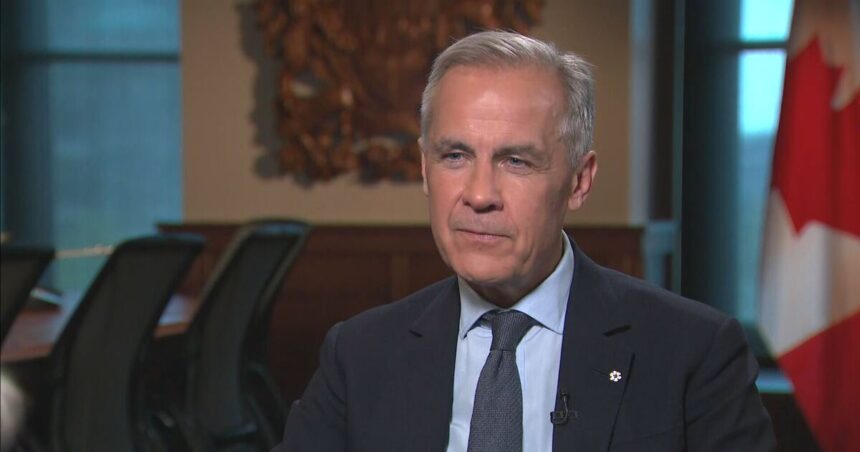In his first major Canadian interview since assuming office, Prime Minister Mark Carney offered a substantive roadmap for addressing Canada’s economic challenges, particularly focusing on investment strategies and energy transition during an extensive conversation with CTV News this weekend.
“The fundamental issue facing our economy right now is productivity,” Carney stated, setting the tone for the wide-ranging discussion. “We’re simply not generating enough output per hour worked, and that’s reflected in our standard of living. The solution is straightforward, though not easy – we need to increase business investment.”
The Prime Minister, who previously served as Governor of both the Bank of Canada and Bank of England, delivered a stark assessment of Canada’s investment landscape, noting that business investment currently sits at approximately 10% of GDP, significantly below the historical average of 13-14%.
“That three-percentage-point gap represents roughly $100 billion annually in missing investment,” Carney explained. “If we’re going to increase productivity and generate sustainable economic growth, we need to close this investment gap.”
When pressed on his administration’s approach to Canada’s energy sector, the Prime Minister articulated a nuanced position that acknowledges both climate imperatives and economic realities. “We have enormous potential in traditional energy resources, particularly natural gas, which will remain relevant globally for decades,” said Carney. “But we must simultaneously accelerate our transition to clean energy, where we have tremendous advantages in critical minerals, hydrogen, and hydroelectricity.”
The interview revealed Carney’s detailed understanding of the global investment landscape, drawing on his extensive experience in international finance. “Capital is mobile, and it flows to where returns are highest,” he observed. “Too often in Canada, we’ve created regulatory and policy environments that deter investment rather than attract it.”
Industry analysts have responded positively to Carney’s economic vision. “His diagnosis of Canada’s productivity challenges is spot-on,” said Dr. Elizabeth Morgan, economist at the University of Toronto. “What’s refreshing is his recognition that solving our economic problems requires attracting capital, not just redistributing existing resources.”
Environmental groups have expressed more cautious optimism about the Prime Minister’s energy strategy. “We appreciate his commitment to clean energy transition,” noted Michael Taggart, policy director at Climate Action Canada. “But the continued emphasis on natural gas expansion raises serious questions about meeting our climate commitments.”
The interview comes at a critical juncture for the Canadian economy, with inflation moderating but growth remaining sluggish. Recent Canada News reports indicate that business confidence has improved following Carney’s election, though concrete investment decisions remain pending.
Perhaps most striking was Carney’s frank assessment of Canada’s competitive position. “We need to be honest with ourselves – in recent years, we’ve fallen behind in the global competition for capital,” he acknowledged. “Other jurisdictions have been more decisive in creating conditions that attract investment, while we’ve sometimes been caught in policy paralysis.”
The Prime Minister concluded with a call for national unity on economic priorities. “Despite our regional differences, we share common economic interests,” Carney emphasized. “Whether in Alberta’s energy sector, Ontario’s manufacturing base, or Quebec’s clean technology industries, increased investment benefits all Canadians.”
As Canada navigates complex World News developments and domestic challenges, the fundamental question remains: Can Carney’s administration translate his sophisticated economic understanding into effective policies that will successfully reverse Canada’s investment decline and position the country for sustainable prosperity in a rapidly transforming global economy?










